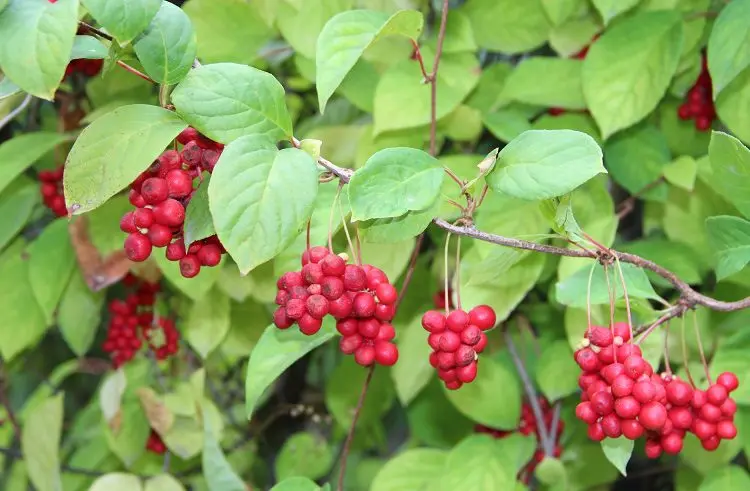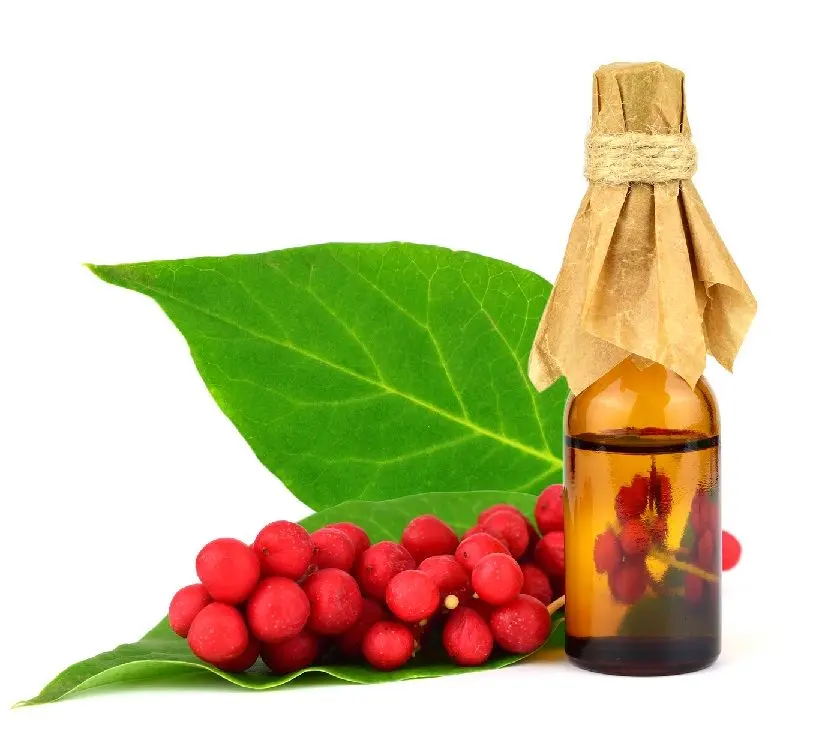Contents
Chinese lemongrass (Schisandra chinensis) is a vine that grows in the wild in the Far East. The plant takes root well in household plots in the European part of Russia, Ukraine and Belarus. If desired, a shrub can be formed from lemongrass, but it still needs supports or trellises, otherwise there will be no good harvest.
For 5000 years, lemongrass has been one of the most popular herbs in Chinese medicine. It is believed that the legendary emperors Fu-hsi and Shen-nong, who ruled the country for more than 100 years and maintained harems until old age, ate lemongrass berries daily.
During the war, lemongrass tincture was given to pilots before night flights: the remedy sharpens eyesight. In Siberian hospitals, medicines from the fruits of the plant were widely used to treat the wounded. Today, pharmacies sell tincture of lemongrass for alcohol, but it is easy to make it yourself.

Healing properties of lemongrass
Scientists who studied the chemical composition of lemongrass came to the conclusion that the fruits and, to a lesser extent, the stems, leaves and roots of the liana contain the substances schizandrin and schizandrol, which have a very strong tonic effect on the body.
Also found in lemongrass:
- vitamins C, B1, E, PP and beta-carotene, and in large quantities. These substances have an antioxidant effect. They accelerate tissue regeneration and collagen synthesis, normalize metabolism, strengthen vascular walls, and prevent premature skin aging. Vitamin B1 stimulates the brain. Beta-carotene improves vision, softens the skin and increases its elasticity. Vitamin E eliminates the effects of stress;
- phosphorus, calcium, potassium, manganese, copper, magnesium, iodine, nickel, chromium, selenium, iron, zinc, aluminum, molybdenum, cobalt;
- malic, tartaric and citric acids, which improve digestion, prevent the formation of kidney stones and lower blood cholesterol levels;
- pectins – polysaccharides that improve metabolism and accelerate the removal of toxins from the body;
- Omega-6 (linoleic and linolenic acids), which are involved in the synthesis of sex hormones;
- Omega-9 (oleic acid), necessary for the formation of cell membranes.
Lemongrass tincture is most often used as a tonic and adaptogenic agent that helps to improve well-being in adverse conditions, increase stress resistance, and body endurance. The tool is often taken by athletes.
Also, tincture is recommended for use in the following cases:
- when it is necessary to strengthen the immune system, especially during epidemics;
- fatigue, depression, drowsiness, significant physical and mental stress;
- hangover, food or alcohol poisoning;
- rehabilitation after operations and serious illnesses;
- colds, respiratory diseases, including tuberculosis;
- diabetes;
- hypotension;
- hypertension (not in all cases);
- vascular dystonia;
- atherosclerosis;
- wounds, trophic ulcers;
- bleeding gums;
- impaired vision, farsightedness;
- digestive disorders;
- prostatitis;
- problems with potency in men;
- irregular periods, ovarian disease, infertility in women;
- various manifestations of menopause: irritability, hot flashes, urinary incontinence;
- poor skin condition, wrinkles;
- oncological diseases.
Preparation of lemongrass tincture
The fruits and shoots of lemongrass can be infused with vodka, high-quality double-distilled moonshine or alcohol (70 or 95%). The medicine is taken drop by drop and diluted with plenty of water, so the strength of alcohol does not really matter. However, in case of gynecological diseases, diseases of the gastrointestinal tract and the cardiovascular system, it is better to use alcohol with a strength of up to 40–45% for infusion.
Lemongrass tincture recipe options:
- 100 g of ripe or dried lemongrass berries, 500 ml of alcohol;
- 50 g of lemongrass seeds, 500 ml of alcohol;
- 1,5 m of annual shoots of lemongrass, 500 ml of alcohol base.
Caveats
If there are no berries or seeds of lemongrass, the medicine is prepared from vines: stems with leaves or buds. But they are strictly forbidden to harvest in the spring, when there is an intensive movement of juices from the roots to the tops of the shoots: the tincture will turn out to be so strong that it can damage the vessels.
Due to the high content of organic acids in lemongrass juice, it is able to provoke an oxidation reaction, due to which the tincture will become poisonous. Therefore, lemongrass berries should never be placed in aluminum or enameled dishes with chips, even plastic containers are undesirable.
Recipe
Before infusion, fresh lemongrass berries are squeezed, the seeds are ground in a coffee grinder, the vine is finely cut with a knife. The crushed raw materials are poured into a glass jar, poured with alcohol and put in a dark place for 2 weeks. Every day the tincture is shaken. After 2 weeks, it is filtered and stored in a dark, cool place.

Application of lemongrass tincture
A single dose of lemongrass tincture can only cheer up a little. The tangible effect of the drug appears approximately 15 days after the start of the intake. If another scheme is not recommended for a specific disease, then the medicine is taken in courses lasting 1 month, the interval between them is a week. Up to 3 courses in a row are allowed, then you need to take a break for 1-3 months.
Usually the tincture is taken 2 times, but for some diseases – 3 times a day. The medicine is mixed with 50-70 ml of water and drunk half an hour before meals or 3-4 hours after it.
For 4-6 hours after taking the tincture of lemongrass on alcohol or vodka, one feels cheerfulness, a surge of strength. Therefore, the last dose of the medicine should be no later than 17-18 hours.
For the prevention, strengthening of immunity and treatment of most diseases, it is recommended to take 20-40 drops of tincture 2 times a day. The dose of the drug depends on body weight and other characteristics of the body. The individual dosage is determined empirically. For the first time, you need to start taking the medicine with 10 drops. If within 2-3 days there is no nausea, tachycardia, excessive increase in blood pressure (from 120 to 150-160 units) or allergic reactions, the dose can be increased by 5 drops, then a little more.
Prevention of influenza
In the fall, during a flu epidemic, you can take a regular tincture 2 times a day or prepare a stronger immunostimulant:
- 0,5 l tincture of lemongrass on vodka;
- 2 tbsp. l. honey;
- 10 rose hips.
The medicine is insisted for 2 weeks, filtered and taken 30 drops 2 times a day, the course is 35 days.
Metabolic disorders, skin rash (including acne)
To normalize metabolism and purify the blood, a medicine is prepared:
- 250 ml lemongrass tincture;
- 200 g of nettle (preferably May).
- The remedy is insisted for 10 days and taken 30-40 drops 3 times a day.
For skin problems (wrinkles, spots, rashes), a tonic lotion is applied externally:
- 50 ml lemongrass tincture;
- 1 tsp glycerin;
- 450 ml water.
Vegetovascular dystonia and atherosclerosis
For the treatment of these diseases, it is necessary to prepare a tincture:
- 50 g of lemongrass berries;
- 90 g dry sage;
- 800 ml of vodka;
- 400 ml water.
The medicine is insisted for 40 days in the light, filtered and taken once a day, half an hour before meals, 1 tablespoon mixed with 1-30 ml of water.
Hypertension and hypotension
With hypotension, you can only take tincture of lemongrass fruits, including pharmacy. Pharmacy tincture is contraindicated for hypertensive patients: it increases blood pressure.
For the treatment of hypertension in Chinese folk medicine, a tincture of lemongrass seeds is used, carefully freed from the peel and pulp, and then crushed. It is taken 20-30 drops 2 times a day. But this tincture is not suitable for everyone. If, due to it, the pressure begins to rise, the reception should be stopped immediately..
Contraindications to taking lemongrass tincture
Lemongrass tincture is forbidden to take:
- pregnant and lactating;
- children and adolescents under 16;
- with epilepsy;
- with frequent insomnia;
- in the acute phase of infectious diseases;
- with violations of cardiac activity;
- with increased intracranial pressure;
- with a stomach ulcer;
- in chronic liver diseases.
Attention! Lemongrass tincture is a very strong remedy, it is not compatible with all herbs and even more so with drugs. Therefore, before starting treatment with tincture, it is necessary to consult a doctor.









